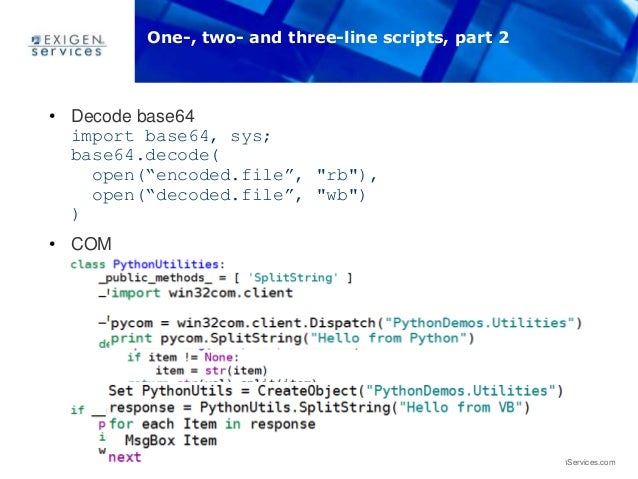
It is added to your macros.json local file with this simple function: > codext.add("example-macro", "gzip", "base62", "gzip", "base63", "gzip", "base64"] The following shows an example of what it looks like: Multi-round encoding can be used thanks to the simple API: > codext.encode("test string", "my-encoding") ^ apply 10 rounds of "my-encoding"
Decode python full#
Note that, while it is not designed to be full of nice-looking colorful tools, CodExt ’s features overlap with some other projects: It leverages the neat API of the native codecs library, using a very flexible logic for defining and lookup up codecs. It does not display fancy useless colors, it does just enough for IT pros to encode/decode anything. This package aims to be used as a library in other projects or to provide some useful tools for working from the terminal.
Decode python install#
This library is available on PyPi and can be simply installed using Pip: $ pip install codext Why? $ echo "CodExt, a Python library to encode/decode anything !" | codext encode manchester gzip base58 bcd lz77 base37 lzh2f4w9om6eytpu49lcbiyb5jccsigxm09r Setup It provides 120+ new codecs and also features a guessing mode for decoding multiple layers of encoding and CLI tools for convenience. Install your packages correctly if you are getting " ModuleNot FoundError".CodExt is a (Python2-3 compatible) library that extends the native codecs library (namely for adding new custom encodings and character mappings), hence its name combining CODecs EXTension. We saw how HTML script is removed and replaced with ASCII characters. In this article, we learned to decode HTML entities into Python String using three built-in libraries of Python such as html, w3lib.html, and BeautifulSoup.

pip install w3libįrom w3lib.html import replace_entities print(replace_entities("£682m")) It provides replace_entities to replace HTML script with Python String. In order to avoid " ModuleNotFoundError", install w3lib using pip install using the given command. £682m Example: Use w3lib.html Library to decode HTML Entities Print(BeautifulSoup("£682m", "html.parser")) html.parser is passed as an argument along with the HTML script to BeautifulSoup because it removes all the extraneous HTML that wasn't part of the original string (i.e. But in the case of Beautiful Soup 4, entities get decoded automatically. For Python 2.x, you will need to specify the convertEntities argument to the BeautifulSoup constructor. For versions below this, use Beautiful Soup 3. It uses BeautifulSoup for decoding HTML entities.This represents Beautiful Soup 4 as it works in Python 3.x.

© 2010 Example: Use Beautiful Soup to decode HTML Entities It replaces ASCII characters with their original character. It has html.unescape() function to remove and decode HTML entities and returns a Python String. Example: Use HTML Parser to decode HTML Entities So, these three methods will decode the ASCII characters in an HTML script into a Special Character. A programmer who does not know about HTML script can decode it and read it using Strings. It increases the readability of the script. Let us discuss decode HTML scripts or entities into Python String.
Decode python code#
We will use some built-in functions and some custom code as well. In this article, we will learn to decode HTML entities into Python String.


 0 kommentar(er)
0 kommentar(er)
